'In lust there is always conquest and destruction.'
Ross Poldark Internal Book 1 Chapter 18 Part 2
Of the two of them it was Ross Poldark who was the first to be unfaithful to Demelza on ninth May 1793. This was six years into their marriage and three years before Demelza did the same. The previous essay A Fall From Grace in a Fall For Hugh explored what Demelza thought were the reasons behind her infidelity with Hugh Armitage and set out over a number of pages her extensive self reflection and examination in the aftermath. But there were no pages of this of any such by Ross in respect of his infidelity. Perhaps it was because Ross was confused by his actions. After all he did deem it to be 'unexplainable'. However in the penultimate book of the saga Ross thought of '...the few minutes of anger and lust and overpowering frustration from which Valentine could have been born.' ('The Twisted Sword' Internal book 3 chapter 8 part 5) In any case, from the outside looking in and with Graham's narration to provide aid, it is possible to understand what Ross found was unexplainable to himself. Therefore, whilst this specific essay does not seek to consider whether this 'May incident' was a matter of rape or not, it will focus primarily on 'the scene' just before where Ross 'took' Elizabeth and how the reasons and factors for Ross's own fall from grace are surprisingly similar to Demelza's. But, it will also explore how on the other hand the presence of a separate most triggering and a wholly negative emotion is where there is the difference and in turn makes Ross's fall a more sordid and ugly affair because in the moment Ross was directed by a hate that was destructive.
Just Like Demelza's Reasons
'It had happened, cut off from the rest of the world...opportunity, which had settled on them like a strange bird, making unreality out of isolation and giving her the feeling that she was no one, except a name-less woman to be taken by a nameless man.'
Demelza's reflection on her infidelity 'The Four Swans' (internal book 3 Chapter 1 part 2)
Demelza's reflection on her infidelity 'The Four Swans' (internal book 3 Chapter 1 part 2)
Like Demelza, as set out in the A Fall From Grace in a Fall For Hugh post, the factors in place which coaxed Ross's infidelity were 'attraction', 'opportunity' and the 'unreality out of isolation'. Indeed, just as there is no dispute that Demelza was attracted to Hugh Armitage, there is no doubt that Ross was attracted to Elizabeth. Just like Demelza ended up on a deserted beach with Hugh and this provided an opportunity and a venue for her infidelity to take place, a perfect opportunity and venue was provided for Ross to sleep with Elizabeth. After barging in to Trenwith and then following Elizabeth into her bedroom out of fear that she might be going to call for help, whether he had plans for one or not Ross found himself in the ideal place for a tryst with her. There was no other person present and so this served to similarly provide the isolation that the deserted beach provided for Demelza with Hugh.
.GIF) |
The latest series did not include the full book dialogue, |
Again, just like how the opportunity and isolation that Demelza felt on the beach had fostered a feeling of an 'unreal' situation for her with Hugh, so too was this the case for Ross with Elizabeth. Graham actually wrote comments made by Ross that show that this was indeed his mindset in the moment. Before carrying her to the bed Ross said to Elizabeth "There's no tomorrow. It doesn't come. Life is an illusion....Let us make the most of the shadows." The similarity with Demelza's feeling of being cut off from the real world and therefore feeling like a nameless woman on the beach with Hugh, has a strong likeness to Ross thinking in that moment that he and Elizabeth were not participating in a real life scenario but an illusion. Ross then suggested that he and Elizabeth make the most of it as if this was an opportunity to do something that could be a secret and hidden from the real world. Again, this is very much the same outlook Demelza had on the beach with Hugh.
Ross's Provoking Emotion (Anger & Hate)
It is unfair to put Demelza and Ross's infidelity quite on par with each other. Though much shorter in time than Ross and Elizabeth, Hugh had still nevertheless built a connection with Demelza where over time of applying increasing pressure on her, he appealed to her sympathy until in such circumstances as described above, she yielded to that. While Demelza in the books was an almost passive participant in her infidelity who had not actually sought it out in the moment (but in that last moment had not stopped Hugh’s opportunistic advance to her on the beach, and while she also returned 'some' of Hugh's love in the lovemaking), in Ross's case, he was the instigator who in the moment, unlike Demelza had not only sought out the infidelity, but was prepared to, and actually did use force for this.
Ross and Demelza both had on single occasions been moved to unfaithfulness by reasons and factors that seemed to match, but this was with the exception of the most provoking emotion. This emotion was the final trigger that pushed both of them individually to do something that they probably never would have thought they were capable of doing otherwise. Making quite a big difference in so many aspects yet to be explore on this blog, for Demelza this was a relenting emotion of pity. However, perhaps making Ross's infidelity a much darker scenario rather than the more romantic scenario Demelza had, Ross's one was on the other end of the emotional scale. In the moment for Ross, what was displayed in action was the provoking and igniting emotion of 'hate'. Hate infused by Anger. Indeed, along with frustration and lust, these were its bedfellow and they powered this hate so that it went from the state of a noun to the doing nature of a verb. This then resulted in Ross not just being angry towards Elizabeth but speaking hatefully and actually doing a hateful act against her on that May night.
Ross: Mad With Jealousy!
Jealousy: generally refers to the thoughts or feelings of insecurity, fear, and concern over a relative lack of possessions or safety. Jealousy can consist of one or more emotions such as anger, resentment, inadequacy, helplessness or disgust.
Wikipedia
When Ross met Elizabeth at Sawle Graveyard three years after the event that occurred on 9th May, he told her he had acted as he did then because he was "..mad with jealousy." Automatically people can associate that with love. However though jealousy can be associated with love, it is not a requirement. After all, a person can still be jealous when a person who they do not love prefers or wishes to spend time hanging out with someone else for an evening. Even still, Ross did not discover until afterwards that his love for Elizabeth was not the kind that was fundamentally his real and true one. The key understanding to have with jealousy is that it is an ego based emotion and often referred to as a feeling of insecurity and fear at the possibility of losing something that person feels entitled to. Psychologists including ones that contribute at Psychology Today endorse the above Wikipedia definition as one of the best definitions for jealousy. However another relevant matter in considering Ross's situation is the emotions jealousy can fuel including anger, resentment and disgust. Such is the case that domestic violence educators refer to jealousy as being something which can play a role in a cycle of abuse. Jealousy in it's worst form can be destructive, and so whilst Ross may have been trying to massage Elizabeth's ego at that graveyard meeting in the hope she would assume jealousy confirmed love, he instead was highlighting an emotion which made it more likely that charged up with anger and lacking trust and respect for her as an antidote, he would not be operating as if directed by love.
Hate And Anger- A Close Association
Hatred/hate: is an intense negative emotional response towards certain people, things or ideas, usually related to opposition or revulsion toward something. Hatred is often associated with intense feelings of anger, contempt and disgust. Hatred is sometimes seen as the opposite of love..
The Penguin Dictionary of Psychology (2002)
Ross once warned Demelza to be wary of Hugh Armitage. He saw she felt sympathy for him and Graham wrote that Ross '..had a suspicion that a little dramatization of Hugh's illness had not been altogether absent in order to enlist Demelza's greater sympathy.' ('The Four Swans' Internal book 3 Chapter 10) In light of Ross holding that suspicion, a little earlier in that sixth book he had told Demelza in respect of Hugh to "Have a care, Pity, they say is akin to love." ('The Four Swans' Internal book 3 Chapter 1 Part 2) Indeed, just like pity and love are closely related, so too are anger and hate. This is just as the Penguin Dictionary of Psychology defines, (as set out above). Having said this, of course a person can pity someone without loving or being in love with them. Equally a person can be angry with someone without hating them. Anger is an emotional state of the soul which manifests itself in expressions of frustration and upset. Whereas hate is a condition of the heart where there are more logical and tangible grounds of some substance to be the basis for such a feeling. And so for instance to be disgusted at an act as well as at the person who did this. This hate can then cross a boundary to wanting to inflict harm or destruction to the hate figure of the moment. While it is clear that Ross was expressing his anger at Elizabeth during, or at parts of the May night, as discussed further below, there were indeed matters of substance that caused the critic in him to judge Elizabeth negatively so that in those moments Ross did indeed have grounds for his hate.
Love And Hate - In That Moment An Absence of Love And The Presence of Hate?
'The thing struck at him two ways together, at his love and at his hate. Either by itself he could have mastered. Together they were overpowering.'
Narrative of Ross upon receiving Elizabeth's letter announcing she will marry George Warleggan ('Warleggan' Internal book 3 Chapter 5)
From the above narrative extract, Graham himself introduces the emotions of both 'love' and 'hate' as being a factor in Ross's behaviour during this May incident. Certainly these were the key emotions he felt when he read Elizabeth's letter informing him she would be marrying George Warleggan. It conveys that given the overpowering nature of these emotions Ross was driven even to ignore his beloved's wife's request that he not go to Trenwith to see Elizabeth. However, it is clear that what drove Ross's behaviour later on when he was at Trenwith was a separate and different matter with a different balance of emotions. This behaviour would be more extreme and more clear in where it leaned on the scale of love and hate. A clear imbalance which would include verbal and physical abuse from Ross to Elizabeth of the kind that most readers reading for the first time would have been shocked by. It was anything but loving and in the heat of the moment culminated in what is repeatedly described throughout the saga as a 'forceful taking' of Elizabeth.
Unequivocally No Love In Abuse
'To truly grasp the essence of love, one must first recognise and understand what it isn’t. And love unequivocally excludes abuse.'
If the reason Ross did what he did to Elizabeth that May night was due to love then his reason for his behaviour would not be so 'unexplainable' to him. In fact it would be the obvious and easiest explanation. This is even if he just kept this for his private thoughts. It was however ‘unexplainable’ to Ross because as a honourable man he disliked violence to a vulnerable woman or person, let alone one he claimed a ten year devotion for. He had saved Demelza from violent assault in their first scene and wouldn’t even smack his children in discipline, preferring to try to pass the buck on this to Demelza. But as well as that he knew what he did to her that night was clearly not love or motivated by this and later he admitted having a conscience over it. Perhaps self criticism and confessing to himself that he had felt hate for Elizabeth in that moment was more of a struggle to acknowledge for Ross than him eventually admitting his idealism of her. Although those two revelations may be related! Yet in this more enlightened and modern age of emotionally intelligent thought, most people will understand and agree that in the act of a man forcing himself on a woman and ignoring her protests for him to stop, there is an absence of love by that man towards the woman in that moment. Or otherwise, that love is in obeyance while other emotions take the lead. It is generally agreed that the excuse or defence by a boyfriend/husband in respect of his domestic violence on his girlfriend/wife, by claiming it was in the heat of an angry moment and only because he loved her so much and was crazy with jealousy, is a toxic and dangerous rhetoric to support. Domestic violence organisations such as Women's aid and campaigns such as 'Mistaken for Love' through 'Abuse is not love', serve to educate on the myths around domestic violence and that there is indeed no love in abuse. Instead it is about dominating, control and serving the perpetrators needs to get their way irrespective of the victims wishes. And this is done with no loving concern and consideration for the victim.
Though not a strict comparison since Ross was not charged up with anger at the time, in 'Warleggan' when him and Demelza had been separated for several months he attempted to be affectionate to her in her bedroom and considered that he could 'take' her (sexually). However with some respect for Demelza and the relationship he wanted to preserve with her, he considered that Demelza's likely 'token' resistance would undermine this. In this he showed an interest and consideration for her and that she give herself freely, a free choice without unpleasant undertones. He had centred Demelza in his thoughts. But in this May incident, Ross who sardonically stated on arrival to Elizabeth, following the news in her letter, that he had come to "pay his respects" to her, did exactly the opposite and he did not centre Elizabeth or her wishes in his thoughts at all. No respectful or loving consideration was shown by him of her. He did not stop when he saw how distressed she was at his aggression. In fact Graham wrote that at the last Ross was not even listening to her words of protest. Ross ignored her! He didn't care! In fact as covered below he took pleasure in her anger.
As love is ultimately nurturing and kind, it cannot be considered that Ross's disregarding and disrespectful behaviour of Elizabeth in 'the scene' was loving or even inspired by loving feelings. Though it may be hard to believe, and as addressed below under the heading of dual conflicting emotions, it is not at all inconceivable that in addition to feeling love for Elizabeth, that Ross could also feel hate towards her as well at all. Clearly in winning, the battle of conflicting emotions in the moment, hate prompted him to act in the hateful way that he did to her. This meant, as stated above, that rather than just express his frustration and anger towards Elizabeth, Ross crossed a boundary and actually inflicted this on her.
A Tangible Basis To Hate Elizabeth?
"At the least you might feel that becoming a friend of his (George) would alienate people you like better."
Ross to widow Elizabeth Poldark ('Warleggan' Internal Book 2 Chapter 3)
Typically Ross had an expectation of George and he had known of George's interest in Elizabeth for years. So Ross himself made a sacrifice of £600 when Elizabeth became a widow with the aim of paying of his ethical duty but also to arm her against the need to take up George's interest. It was Ross’s expectations of Elizabeth that had been let down. Ross took greater offence and was more distressed by the disloyalty against him in favour of George by the woman he had referred to as his ‘greatest friend’, than of George who he expected no loyalty from. This was something that applied to all his friends. Also, retaining the view in the later books that no matter her denials that Elizabeth had indeed married for money, the greater offence to Ross in disloyalty with George was that this should be done against him for money!
Source Of Hatred (Elizabeth's Disloyalty)
'In many ways an easygoing man, he (Ross) would have tolerated much for the sake of loyalty......but Jud's disloyal slander could not be swallowed at any price.'
('Demelza' Internal book 1 Chapter 14).
There is a theme, mainly early in the saga, of Ross having a zero tolerance for disloyalty against him and as a result of this from Jud (in spreading rumours of him fathering Benji Carter), Ross beat him and dismissed him and Prudie on the spot without consultation with Demelza. Ironically, as a name that Elizabeth would later call him in 'Warleggan', Ross asked Demelza if he was a 'bully' since he was rough with Nat Pearce by thumping on his table and breaking his snuff box when he found out he had sold his promissory note to the Warleggans. Ross had stated that "..any friend and honest man would (have kept possession of it)." (Internal book 1 Chapter 7) Graham’s writing suggests that actually Ross could perhaps deem a friend blameless in such a case if the disloyalty was not in favour of George. He did so as he wrote that ‘Ross would not altogether have blamed him (Nat Pearce) had the thing (the promissory note) gone to anyone but the Warleggans.’ So Ross was indeed capable of hateful feelings, and therefore of such hateful behaviour towards a friend for their choices. This was whether this was a long lasting hatred or one that was in the moment. But it was indeed the nature of their choice and style of disloyalty that added the additional insult to his injury and to his disgust and judgment of them.
Ross's Judgment On Character- Disgusted By Disloyalty
Showing how much it upset him, Ross was also liable to violence at the mere suggestion a friend of his could be disloyal to him in favour of George. Graham had also written that Ross physically attacked George for the first time because he had been so upset at George's insinuation that Francis had been disloyal to him and betrayed him in favour of George. And for money! As if disgusted by such a suggestion Graham wrote of Ross 'So the fight had been in defence of Francis's character..' Of course, this is the biggest indication that disloyalty to him in place of allegiance to George was to Ross a judgment and a slur on the character of that person. Therefore this was a tangible basis and a source for where hate and disgust in that person may be found for Ross. In Francis’s case he had benefited from Ross only having a suspicion of his disloyalty and through his recompense to Ross in reaffirming his loyalty and then siding against George. He had redeemed himself and displayed an apologetic and reconciliatory attitude where he evidenced a shared belief and revulsion with Ross against what George stood for.
Elizabeth: "loyalty’s not all on one side, Ross, nor ever has been.” He (Ross) rode home feeling already well paid for his sacrifice but with the old allegiance grievously reaffirmed.
'Warleggan' Internal book 2 Chapter 6
So with Ross's particular sensitivities and judgments around disloyalty against him generally, and this being heightened when it was done against him specifically in favour of George, Elizabeth's marriage decision was an offence Ross would find especially disgusting for Elizabeth to have done. In Elizabeth’s case, as with the above extract, she had previously led Ross to believe that her loyalty was to him above George, and therefore that Ross had her allegiance. So in her announcement of agreeing to marry George, that exposed her as having misled and lied to Ross. It was surely this that was the sting in the tail adding to the offence and the judgment. As well as that, the significance of Elizabeth's perceived disloyalty in deciding to marry George was not just about her shifting her allegiance to Ross’s greatest enemy in marriage, but also allowing that enemy to take over, occupy and manage Ross's ancestral home. These implications would have been an obvious split second realisation to Ross on hearing the news as marriages in that period were often not even about love but what would be acquired from the marriage contract. This was whether this was a title, an inheritance or land. Perhaps that was one factor in Elizabeth delaying in sharing the news to Ross and 'The Black Moon' opened with Nicholas Warleggan noting '..that , as an additional bonus to her patrician breeding, Elizabeth had brought this house into the (warleggan) family, the Poldark family house...' Later Ross would reveal to Demelza that along side his feelings about Elizabeth’s marriage, George moving into Trenwith “..and showing signs of remaining, that’s a -a crowning indecency. Trenwith is part of the Poldark family!” As a major indicator that hate for Elizabeth (derived from anger at her allegiance to George) could possibly overwhelm any love he had for her, Ross explained that this indecent occupation by George, rather than Elizabeth’s marriage to George, had been the thing troubling him that week.
In the early half of the saga there was a long running theme of George's attempts to encroach on all aspects of Ross's life. This was explored in Encroachments and Plans to Kill A Cat (Ross Vs George), where Ross almost miraculously had found ways to slip and slide out of George's grasp each time. So the significance and irony of his supposed 'greatest friend' - Elizabeth's defection and loyalty to George, as set out in that essay on her defection, finally being the means upon which George did eventually take something more precious to him than Elizabeth (Trenwith), cannot be underplayed. From this it is easy to see that even for a moment Ross might have been more than just angry at her but also critical of Elizabeth herself. After all, this was not Ross being angry of a simple mistake made by Elizabeth. It was about a choice that she made which spoke to values and principles that he despised. These were values and principles that Ross did not hold and which he thought and was led to believe by Elizabeth that she didn’t hold either. This would form the disgust in her that Ross actually vocalised and therefore as per definition was an element of his hate.
Dual Conflicting Emotions: A History Of Hate For Elizabeth
"Perhaps there are elements in her (Elizabeth's) nature and mine which would have made our life together difficult."Ross's thoughts on Elizabeth ('Jeremy Poldark' Book 3 Internal Book 2 Chapter 4)
In fact, Graham quite steadily showed that whilst Elizabeth brought Ross to feeling he had a great love and devotion for her, on the other hand there were occasions where she indeed actually irritated him and inspired dark feelings in him about her, rather than this stemming just from the situation he found himself in with her.
While Ross did experience upsets in his relationship with Demelza, she never inspired quite the dark feelings over her character in him, that Elizabeth provoked. Yet Ross was capable of strong, dual and opposing emotions with Elizabeth. For instance, when he met with her at Trenwith after her marriage to Francis, even before their terse conversation had begun, but just on sight on her, Graham wrote 'A black desire rose in him to smash the (her) composure. He subdued it.' ('Ross Poldark' internal Book 1 chapter 7). Then after having had a frosty exchange with her Graham wrote about Ross's '....queer perverted pleasure which came from striking with his barbed tongue at her composure- if that were satisfaction, then he had found some in the interview.' ('Ross Poldark' internal Book 1 chapter 8) Also in 'Warleggan,' after Elizabeth’s 'questionable and vague confession of love' Graham wrote that although Ross found her more attractive, that he still '...found himself liking her less.'
In all those examples of Ross’s dual and opposing emotions for Elizabeth, still believing himself to love her, Ross also had feelings that looked like hate or dislike for her too. It is also significant that none of these particular examples involved George or even a hatred for another third party to then suppose his hatred was directed at that person instead. This suggests that the element of George was not actually a necessary or diverting factor. Instead, irrespective of that, Ross’s disappointment, hatred and dislike could indeed be in Elizabeth in her own right. Though it added to the increased dislike or momentary hatred of Elizabeth, George and a hatred for him was not a necessary part of the equation. However, Ross hated what George represented and was repulsed seeing those traits elsewhere and in others.
Tangible Hatred: Ross Attacks Elizabeth's And Her Character Too
In the heighten state of emotion, in this May incident, now at Trenwith, it is obvious that in the battle between Ross’s love and hate, the hate overpowered love, which was essentially absent or devoured up in the scene. This is most likely in favour of lust which Ross cited instead of love as being what was at play when Valentine was conceived. In 'the scene' it is indeed also hard to find any expressions or undertones of love in Ross’s behaviour as well as his words as the scene goes on. Ross did not care whether Elizabeth was indicating consent or not. In fact Graham wrote that Ross enjoyed upsetting Elizabeth as he wrote 'When he lifted his head, her eyes were lit with anger. He'd never seen her like it before, and he found pleasure in it.' Graham wrote that his anger had given 'extra relish' to his intense passionate kiss of Elizabeth, which in the scene Elizabeth showed was unwanted by her at the time and she slapped him. However, Graham adding a sadistic element to Ross's attitude towards Elizabeth was Graham committed to an atmosphere not only consistent with the lack of love motivating Ross’s behaviour but which takes this out of the arena of just anger. Actually deriving enjoyment from Elizabeth's upset, hurt and humiliation makes this a passion motivated by malice which was driven by the hate. That is the hate that drove him to Trenwith in the first place which wound itself up further by then. But even in the aftermath, aside from a thought by Elizabeth of his caresses, Graham’s narration continues to lack any suggestion of romance and loving behaviour from Ross towards Elizabeth that night. For instance, two books later in ‘The Four Swans’ when Ross kissed Elizabeth farewell at Sawle Church graveyard, Graham wrote that his kisses then were 'Nothing at all violent, this time;....' ‘This time’? Therein lies the distinction between sex and lovemaking, the latter which is not what Ross did that May night. His act was aggression, abuse and violence.
Personal insults inspired by Ross’s criticism and Judgment of Elizabeth’s character
Although back at ‘the scene’ Graham wrote that Ross kissed Elizabeth 'before anger was lost', the context he provided both before and after is consistent with anger and hatefulness leading Ross's actions and words. In the argumentative conversation beforehand Ross threw insults and jibes at Elizabeth that suggested a lack of respect for aspects of her character and his dialogue was fundamentally attacking of Elizabeth's choices, her tendency to be helpless, and his view that her reasons for marrying George were trivial. For instance there’s his comment that "You never have been able to help anything, have you? It has all been beyond your control. All your life you've drifted helplessly down a stream of good intentions." Ross said this rejecting Elizabeth’s claim of not being able to help her decision and in that criticism he seemed to suggest a pathetic and pitiful nature to her character. He had made sarcastic comments about whether he should have considered her a friend, then digs criticising how she had made Francis suffer for her mistakes and was repeating this behaviour. He also implied she was a liar claiming that he had been simpler believing her years before but did not now believe her ‘impostures’. Going back to the definition of hatred cited earlier, Ross's suggestion that she was marrying George first out of gratitude and then for his money was narrated as if Ross viewed this with disgust and contempt rather than compassion and understanding.
In ‘the scene’ Ross's focus was criticism 0f Elizabeth, not George. He was consistent with this as the same applies even when he visited George and Elizabeth seven months later on Christmas Eve and was upset about Elizabeth’s manner towards him. He thought of her as 'George wife'. This is understandable because in the scene she seemed to adopt George's values and that she was in support of him. In the conversation she indicated she trusted that George had dealt with Demelza properly (over the dog bite instigated by George's men when crossing Trenwith land). Therefore she presented to him not just as a stranger but again judging her in her own right, Ross told Demelza that Elizabeth was like an 'enemy'. Ross was no longer in a state of anger at Elizabeth after the event when his own behaviour had somewhat overshadowed her offence of self preservation and his act would then undermine his claim to greater morality. With this and although at that point he did not go on to feel a permanent state of hate for her, his reference to her as no longer a friend to him showed that on a practical level he could now clearly place and compartmentalise her with that negative framing. Again there is a duality of outlooks here as if Elizabeth were an antagonist figure to Ross that he now finally saw for himself was against him but evidently he also continued to harbour affection, perhaps more for the woman (or girl) he once loved in her. Still, in this matter even at this later meeting he was again upset by her, not George. It was what she represented and stood for and this was how he perceived her at the height of his anger during the 'key scene'.
The Lack Of Love In Love Making
With Ross later clarifying that his real and true love was for Demelza and not for Elizabeth, and with Winston Graham’s personal archived notes citing that Ross realised after this incident that his desire for Elizabeth had been a sham, that goes some way to explain the absence of real love but abuse in 'this scene'. Ross’s realisation thereafter of idealising Elizabeth and a idealised relationship with her rings true as it seems that in his anger, reality had over powered Ross’s idealism of Elizabeth and the aspects of her character which in truth irritated Ross and which he once had a fleeting thought would make life with her difficult, were unearthed in his dialogue. They was therefore a foundation to his attack on her character. But neither of them later described their night together as one where they ‘made love’ and the references to what happened by both of them were generally negative rather than romantic. Although Ross in ‘The Four Swans’ thinks to himself that their sex was not so much against Elizabeth’s will (rather than feeling sure it wasn’t) and although he tells Demelza it was pleasurable (for him), he still thought of it with negative unromantic overtones and he felt ‘an uneasy conscience about her for the two misdeeds...’ that he committed against her. One of these Ross considered was that at least in the first instance his taking of Elizabeth was against her will.
A Crime Of Passion For Conquest And Destruction (Frustration, Lust And Anger With Hate)
Passion: 'A very strong feeling about something or a strong belief in something.'
Collins English Dictionary
Crime of passion: 'an outbreak of Anger'
Merriam-Webster Dictionary
Spiteful And Controlled Intentions
Elizabeth; “You treat me -like a slut-“
Ross; “It's time you were so treated-."
With Ross also referencing 'lust' as a feature of his sex with Elizabeth and this probably taking the lead when the anger was lost, it is clear how in the scene Ross's behaviour also aligns with Graham's description of the nature of lust. For instance Ross was prepared to leave if Elizabeth answered the question on if she loved George. It was her lie that she did love George that followed Graham writing 'That settled it.’ It was only then that Ross became physically violence and forceful, as if the prompt for his sexual advance was in retaliation rather than a surge of love. That is again supported by his pleasure at her anger. Then, the single comment from Ross which confirms that of the two emotions being ‘love’ and ‘hate’, he was motivated and led by hate, is when he said "It's time you were so treated (like a slut)." This is incredibly significant because it speaks against the lost of control myth. Ross abandoned his good reason leaning in to his dark desire to impose his control of Elizabeth from the perspective of what his judgment thought she deserved. It also tells the reader that Ross was not thinking about sex with Elizabeth to love and adore her but to treat her badly. Again this is as if in retaliation and punishment for her lie of loving George, and as Graham, and later Elizabeth implies, it was as if this was in order to make a conquest. Perhaps a double end to also encroach on George's new 'possession' and to ‘destroy’, ‘stop’ the wedding or otherwise to ‘taint’ it. It compares sharply against Hugh Armitage's comment to Demelza on the beach saying "I wish you'd let me make love to you." Graham made the distinctions clear including what was motivating each of the men. Hugh wanted to worship Demelza and Ross wanted to degrade and conquer Elizabeth. He intended to treat Elizabeth badly for his own gratification rather than a shared and loving one.
Elizabeth Suspects A Conquest For Destruction
Despite reader presumption about Elizabeth postponing her marriage to George, Graham presents Elizabeth in the aftermath as having reflections on her night with Ross that were generally negative. In those early reflections, in spite of recollecting caresses from Ross during sex (which may too have been violent), she still felt that Ross had treated her 'dishonourably' and that his visit to her was 'an incursion on her privacy, a violent taking of what was not rightfully his.' Consistent with this three years later at their grave yard meeting, Elizabeth referred to Ross as a 'devil' and a 'bully'. In a rather telling reference that Elizabeth did not feel that the 'May incident' was motivated and inspired by love, she told Ross in that sixth book “If your purpose in what you did was destruction, then you altogether succeeded'. Together with her private thoughts after the incident, all of it works to an impression that their night was not one even of eventual romance and love. Instead it is one that fits the image conjured by Ross. This is where he referred to it boiling down in the pinnacle moment to a rough few minutes of his frustration, lust and anger. And this is without suggestion of a romantic and loving experience even after this. It also fits Graham's image of lust driven conquest and destruction. Accordingly the blurred lines in the moments before and after Elizabeth was taken were the thin ones between lust and hate rather than the love gone awol and hate.
Of course frustration and lust was not enough on their own to trigger Ross to act against Elizabeth as he did while she was protesting. Otherwise Ross could have tried to impose himself on Elizabeth at other times in consensual scenarios. For instance when Elizabeth flirted with him in her red dress, when she made her questionable and vague confession of love and when there was ample opportunity whilst she was a widow and he was visiting her weekly. That was when Ross believed that Elizabeth loved and depended on him. The necessary emotion to make Ross take Elizabeth by force was anger but his pursuance of this taking against her objection and her anger which pleasured him came after foreplay lace with what even Elizabeth recognised as hateful horrible aggression.
Elizabeth Called Out Hate
"This is- contemptible! I shouldn't have believed it of you!...To insult me when-...."
"You're hateful, horrible!"
Elizabeth to Ross 'Warleggan' Internal book 3 Chapter 5)
While Ross may have come to Trenwith out of both love for Elizabeth and hate for what Ross considered a shocking betrayal by her, even Elizabeth recognised that Ross’s trigger prompting him to initiate and impose sex was not love. The foreplay in any event included forced violent unwanted kisses on her, pinioning her arm, and insults he had made about her beforehand. Elizabeth had specifically complained that Ross had insulted her, called her a liar and that he was 'contemptible'. Demelza who was treated like a precious jewel on the beach by Hugh and had a letter from him saying that the experience for him was one where he found that ‘Beauty was in my (his) hand.’ In quite a significant contrast Ross made Elizabeth feel like a ‘slut’ and she told him so. Identifying his behaviour as being hateful towards her rather than loving Elizabeth called out his hateful energy towards her saying; "You're hateful, horrible!' So there is no doubt he made her feel that hate was directing how he engaged with her. Ross corroborated and validated that feeling since Graham wrote that when meeting Elizabeth on the two occasions after the event, Ross expected Elizabeth to be angry at him for how he treated her and that his failure to visit afterwards was the ‘additional’ offence.
Special Treatment: Overpowering Love Beats Anger For Demelza
'Ross sometimes wondered if there had ever been a couple who got less on each others nerves than they did.'
Ross thinking about him and Demelza ('The Angry Tide' Internal book 1Chapter 8 part 2)
It is likely the contrast in Ross’s anger towards Demelza against his anger towards Elizabeth was because a real and true existing lived love would ultimately trump an idealised love that was turned platonic and sustained by a sentimentality that comes from nostalgia. But with Demelza Ross never crossed a boundary of this kind of semi sadistic violence discussed. Neither did it include the level of disrespect and attacks on Demelza’s character as he did with Elizabeth. His initial response to Demelza's confession of helping reconcile Verity and Blamey before they chose to elope, was to be extremely angry with her. However in terms of jabs at her character it only made him reflect on his long held complimentary beliefs of her. For example that ‘Demelza was true to the grain. There wasn’t a flaw in her-in this damned world-‘ And very soon after he softened to her, instead decided Francis was primarily to blame and that ‘Demelza no doubt had acted for the best.’ Later he expressed the view that perhaps Demelza's was “..the common -sense view…”.
But the time of Ross's greatest anger against Demelza was after Hugh Armitage's death and his belief that Demelza had been unfaithful to him. In the final scenes of 'The Four Swans' Graham wrote of Ross's growing anger against his wife and during their confrontation how he felt he could kill her because he loved her. Graham also wrote of how during their exchange where he spoke roughly to her, Ross's words '...choked in his throat and congealed in a greater anger.' However, whilst Ross was snarky and sharp with Demelza at this crisis in their marriage, there is no case for him feeling a momentary hatred for Demelza of substance, and none in what she represented to him. Here his anger was limited to her actions, his distress, frustration and upset about this. Ross’s mad jealousy would never strike out at Demelza.
So it seems Ross could not easily be moved by hate with Demelza in his anger. Clearly one factor was that unlike with Elizabeth, Demelza's character was such that Ross found no elements of substance in it to base a hatred on. This was even in the moment. After all he had considered in 'The Angry Tide' that they were a couple that hardly got on each other's nerves. His attitude about her disloyalty did not have the flavour of disgust to it as it did with Elizabeth. Instead he always considered that it was sympathy that had drawn Demelza to Hugh. He did not find that in it's own right disrespectful and he told Dwight in 'The Angry Tide' that he saw Demelza "...like a sapling blown in a hurricane' in that situation. So Ross barely blamed her and whilst he was salty about her potentially throwing away what they had, he did not attack her character or draw pleasure from her upset. He consoled her!
Where there is true love, it wins out
.GIF) |
| In the book, the scene of Ross and Demelza embracing & crying takes place in the parlour. |
There was an absence of hate in this (and all of Ross’s) confrontation with Demelza. In contrast Ross's angry dialogue to Demelza was instead littered with loving undertones. For instance, Ross seeing Demelza's scuffed shoes in the scene, bending to take them off for her and putting a fresh pair on for her in the midst of their argument, is a scene that is almost reminiscent of the biblical scene of Jesus washing the feet of his disciples. This is only in the sense that it depicts loving servitude just as Ross once spoke of himself as the 'servant' husband early in their marriage and which Demelza also demonstrated to him of herself as a wife when she would typical remove his boots when he returned home. Then Ross's softer tones of eventually asking her to tell him how she felt, his very willing and obedient agreement to her request to embrace her and how in 'The Angry Tide' Ross instead of directing his anger to Demelza, directed it to Monk Adderly, the memory of Hugh Armitage and even George’s fences.
Graham described Ross's pain over Demelza's unfaithfulness to Hugh explicitly in Twisted Sword. Ross thought 'God, how it had hurt at the time! It had burned in him like an acid, corroding the linings of his stomach and his heart.' His anger and pain cannot be underplayed just because he was not violent to Demelza. Instead it suggests Ross’s love for Demelza was an antidote to excessive and disrespectful expressions of anger designed to retaliate, punish or hurt Demelza back. Despite the angry tide in him that came in waves and ebbs thereafter, in Demelza's case Ross was compelled to a more loving tender treatment of her. This was even in moments of angry confrontation because Ross's love which for Demelza was true and real was also founded on a true respect for her character which was placating to his anger. With Demelza, for Ross, Love was the most overwhelming emotion and that overpowered his anger. Unfortunately for Elizabeth, Ross's connection with her was not founded on such a solid basis or a reality based emotion of love and respect. Therefore, she in the heat of the moment was not afforded the same grace Demelza had, had it been so. Accordingly in Elizabeth's case Ross's anger and hate had its dark way with her.
Other Blogs That May Be Of Interest
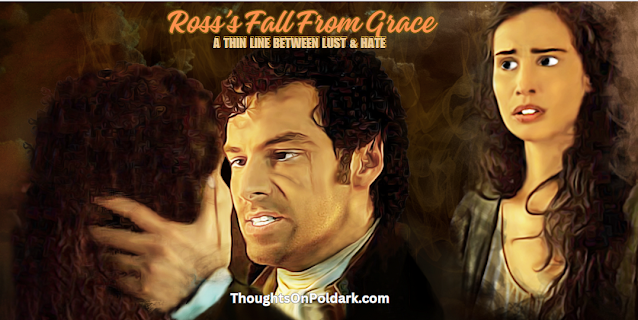

.GIF)
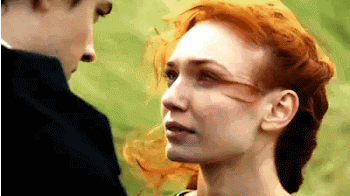
.GIF)
.GIF)
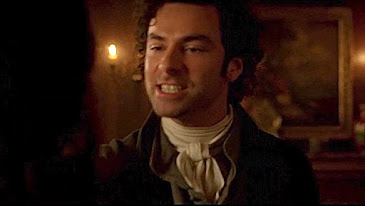
.GIF)
.GIF)
.GIF)

.GIF)
.GIF)
.GIF)
.GIF)

.GIF)
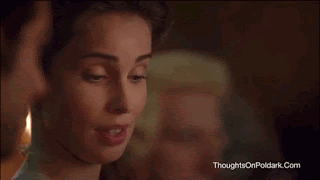
.GIF)
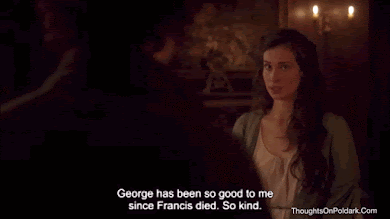
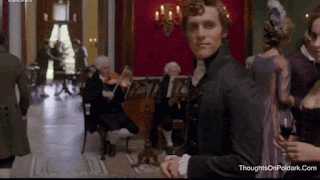
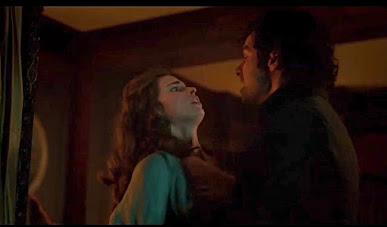
.GIF)
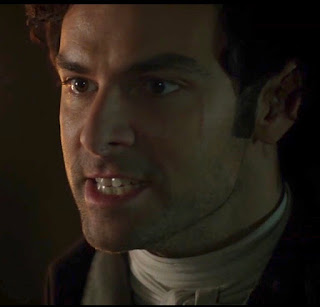
.GIF)
.GIF)
.GIF)
.GIF)









